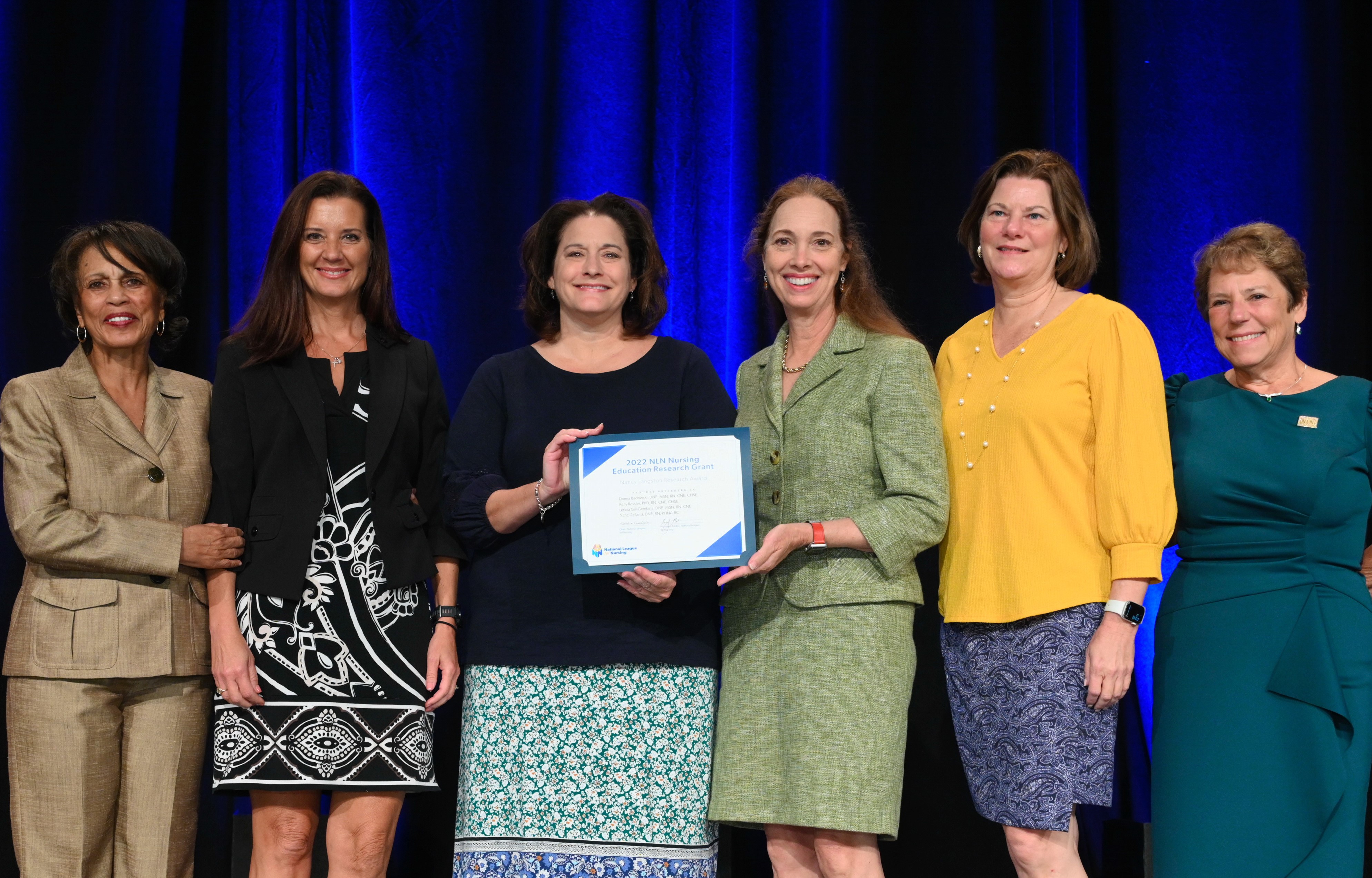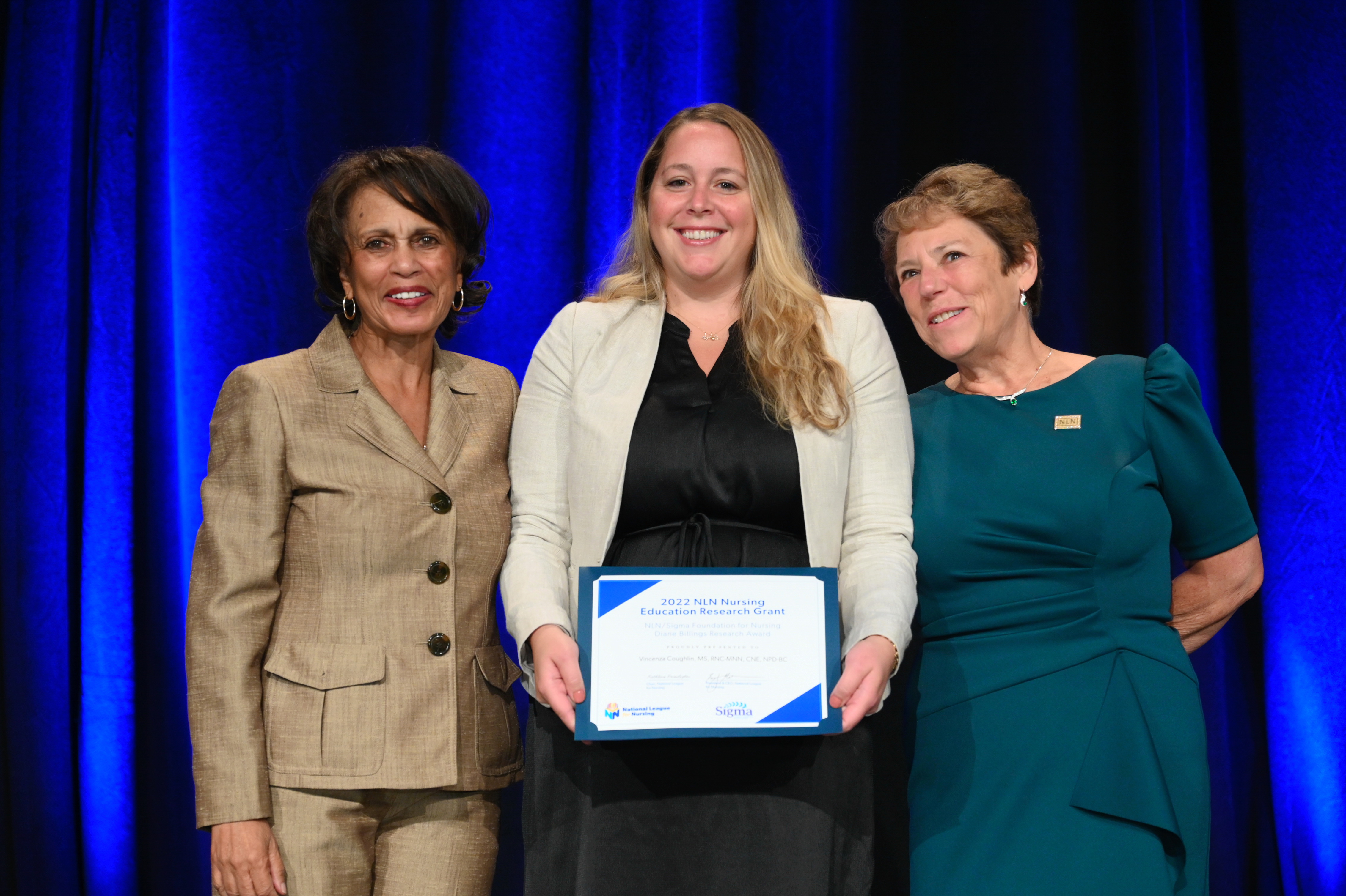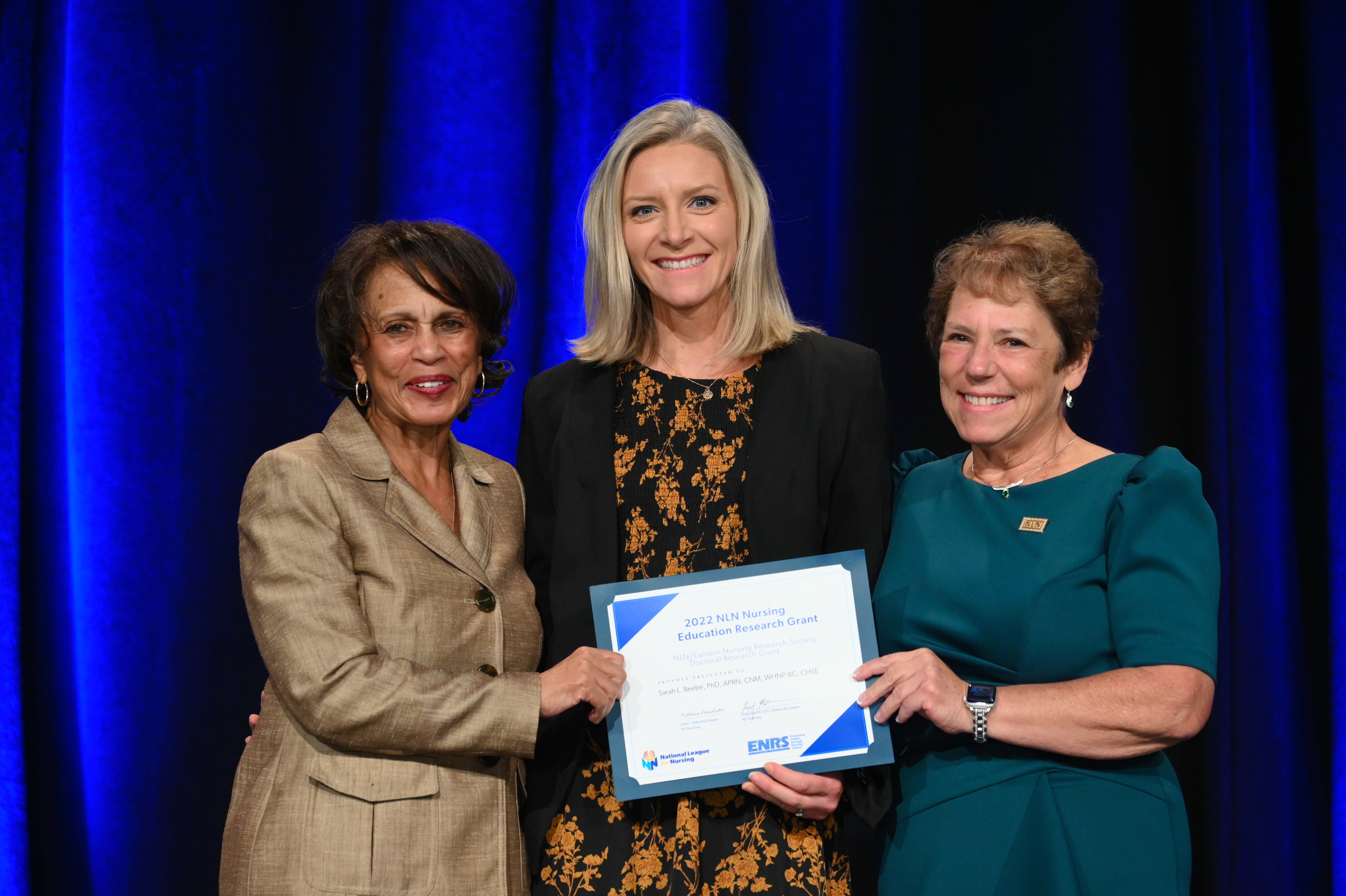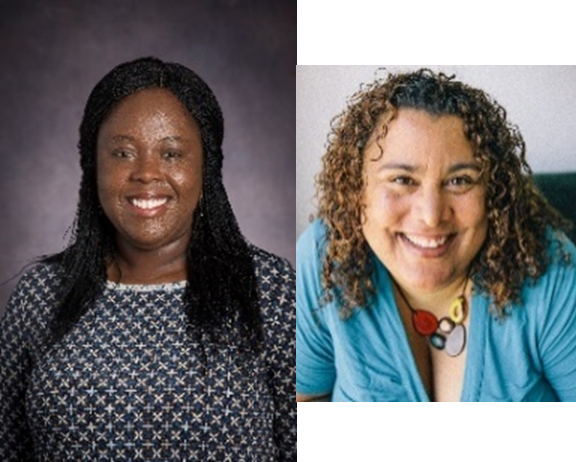2022 Research Grant Recipients
Ruth Donnelly Corcoran Research Award

Project Title Exploring Inclusive Teaching Practices During Simulation Experiences
Jessica Draughon Moret, PhD, RN; Kupiri Ackerman-Barger, PhD, RN, CNE, ANEF, FAAN; Amy Nichols, EdD, RN, CNS, CHSE, ANEF; Jennifer J. Edwards, MS, RN, CHSE; and KT Waxman, DNP, RN, FAAN
University of California Davis Betty Irene Moore School of Nursing and University of California San Francisco School of Nursing
Amount Awarded: $30,000
Abstract: Significance: As schools of nursing strive to expand diversity and inclusion efforts nursing educators have an opportunity to revisit teaching practices to ensure we are engaging in instructional strategies that are both inclusive and representative. Because simulation has been recognized as a highly effective instructional method and has been so widely adopted across nursing learning environments, it is important to explore whether the strategies that health professions educators engage in during simulation are inclusive of underrepresented, underserved and/or marginalized students and do not inadvertently embed bias and stereotypes into the learning outcomes. Focus: We will, therefore, conduct a sequential explanatory mixed-methods study to address our research aims. First, we will use surveys to collect data from both nursing students and nursing faculty about perceptions of inclusion during simulation. We will then use the quantitative data to help us construct interview questions that could provide an additional layer of understanding about the experiences of students when learning during simulation and faculty when planning, implementing, and evaluating simulation learning experiences. These data can provide useful insights about promising practices for inclusive excellence in nursing simulations. NLN Research Priority: Build the science of nursing education through the generation and translation of innovative teaching and learning strategy…by way of best practices for clinical education and social determinants of education.
Dorothy Otto Research Award

Project Title: Management of Distractions for Safe Medication Administration: A Multi-Site Study
Denise Campbell, DNP, APRN, ACNS-BC, CEN, CHSE; Bette Mariani, PhD, RN, ANEF, FAAN; Gina Sigler, MS
University of Michigan-Flint School of Nursing, Villanova University M. Louise Fitzpatrick College of Nursing, and MacAulay-Brown Inc.
Amount Awarded: $29, 900
Abstract: Background: Medical error is the third leading cause of death in the United States (U.S.) with medication errors the most common. Distractions which occur in healthcare have been linked to errors in medication administration (MA). Evidence supports nurses’ belief that medication errors may be caused due to being plagued with competing demands distracting them during MA. NLN Research Priority: This project addresses the NLN Research Priority of building the science of nursing education through the generation and translation of innovation by evaluating innovative teaching and learning strategies and emergent technologies. Using the technology of simulation, this project has the potential to advance patient safety and facilitate the development of safe MA practices in future nursing professionals. The goal of this project is to demonstrate how an enhanced simulation bundle can be an effective methodology to enhance MA safety practices with undergraduate nursing students. Methods: A multi-site mixed methods randomized pre-post design will be used to evaluate the use of two different strategies, an enhanced simulation bundle including virtual simulation, distraction training and a high-fidelity simulation-based experiences (SBE) on the management of distractions during MA versus a traditional simulation bundle including a virtual simulation, review of safe MA process and a high fidelity SBE reinforcing safe MA practices. Data Analysis: Outcomes measured pre- post- include student satisfaction and self-confidence with MA and distraction strategies and scores from the virtual simulation scenario and the Medication Safety Critical Element Checklist (MSCEC). Reflections will be coded to look for patterns and themes.
Nancy Langston Research Award

Project Title: Teaching Motivational Interviewing Skills to Pre-Licensure Nursing Students: A Comparison of Simulated Telehealth, Simulation Gaming Technology and Traditional Clinical Learning Environments
Donna Badowski, DNP, RN, MSN, CNE, CHSE; Kelly Rossler, PhD, RN, CNE, CHSE; Leticia (Tish) Gill-Gembala, DNP, MSN, RN, CNE; and Nanci Reiland, DNP, RN, PHNA-BC
DePaul University School of Nursing, Baylor University Louise Herrington School of Nursing, Temple University College of Public Health, and Lewis University College of Nursing & Health Science
Amount Awarded: $18,000
Abstract: Background: Telehealth is an approach in which Registered Nurses can deliver patient-centered approaches to nursing care. Furthermore, there is a national call to shift the practice experiences of nursing students from acute care to community-based and public health settings. Communication is one key contributor to the success of Registered Nurses in roles as frontline advocates and users of patient-centered care approaches which positively impact healthcare outcomes. Motivational Interviewing is recognized as an evidence-based, patient-centered communication technique that assists people to commit to healthier lifestyles (Miller & Rollnick, 2013). Purpose: This research will examine pre-licensure nursing student perceptions and effectiveness of a simulated telehealth patient care experience as compared to a simulated gaming technology experience or traditional clinical experience. Motivational Interviewing education module on empathetic communication skills. Methods: A multisite quasi-experimental repeated measure design will be used. A non-probability, convenience sample will be recruited from four pre-licensure nursing programs. Empathy/reflective listening will be measured using the Helpful Response Questionnaire (Miller et al., 1991). The System Usability Scale will measure student perceptions of the usability of the technology platforms (Brooke, 1995). A power analysis (alpha = 0.05, effect size of f = 0.25 and power = 85%), demonstrated a minimum of 39 participants per study site. Data will be collected via Qualtrics© and analyzed via a statistical software program. Results: Findings will add to the science of nursing education by building capacity for nursing practice through linking health promotion communication skills with innovative telehealth technology and transferability to the clinical practice.
NLN Foundation & Edmund J.Y. Pajarillo Research Award

Project Title: Digital Approach to Dementia Care Education
Kathleen Morales, PhD, RN, CNE; Modupe Adewuyi, PhD, RN, PHNA-BC, CHSE; Cynthia Johnson, PhD, RN, CHSE; & Rebecca Gee, PhD, RN, CHSE
University of West Georgia Tanner Health School of Nursing, Kennesaw State University WellStar School of Nursing, and Middle Georgia State University School of Health and Natural Sciences
Amount Awarded: $15,708
Abstract: Background: Dementia is a permanent progressive neurodegenerative disorder with a high global prevalence. As a result, the U. S. Department of Health and Human Services (USDHHS) National Plan to Address Alzheimer’s Disease recommended that all healthcare professionals be prepared to address the complex needs of people with dementia. Many prelicensure nursing programs adopted alternative and innovative digital and clinical experiential learning approaches to answer the call to transform nursing education. Those approaches included e-learning modules and virtual simulation sessions. While such methodologies are increasingly used to enhance learners’ knowledge and attitudes, limited evidence exists to inform best teaching practices. Purpose: This proposed research study will evaluate the combined effect of an e-learning module with a Virtual Dementia Tour® on knowledge and attitudes toward person-centered dementia care in prelicensure nursing education. Methods: The multi-site study will be a crossover-experimental design with repeated measures (baseline, post e-learning module, and post virtual simulation). The convenience, self-selected sample of prelicensure nursing students will be recruited from three public universities in the Southeast United States. Significance: Nursing education needs to address this critical issue by preparing the next generation of nurses to meet the National Plan to provide care for people with dementia and their support system. The findings from this study may help build a workforce with skills to provide high-quality person-centered care.
Mary Anne Rizzolo Doctoral Research Award

Project Title: Trauma-Informed Care in Nursing Curricula: Development of a Simulation-Based Educational Framework for Health Professions
Heather Guest, MSN, RN, CNE, CHSE, Doctoral Candidate
Texas Tech University Health Sciences Center; University of Texas at Tyler School of Nursing Doctoral Program
Amount Awarded: $2,500
Abstract: Problem: Trauma is recognized as a pervasive public health problem requiring a trauma-informed (TI) approach from health professionals. Simulation is an evidence-based teaching strategy that advances knowledge and clinical reasoning. However, there is a lack of scientifically based simulation education models addressing the delivery of trauma-informed care (TIC) in health professions programs. Objective: The objective of this study is to understand what elements constitute a comprehensive, trauma-informed, multidisciplinary health professions simulation framework to improve the delivery of TIC to traumatized patients. The results of this study will build the science of nursing education through the generation and translation of innovative teaching and learning strategies. Research Question: What elements constitute a comprehensive, TI, multidisciplinary health professions simulation framework to improve the delivery of TIC to traumatized patients. Methods: A Delphi study utilizing a panel of experts on the provision of TIC will be conducted to identify the most critical multidisciplinary elements of a comprehensive, TI, multidisciplinary health professions simulation framework to improve the delivery of TIC to traumatized patients.
Co-sponsored Grants
NLN/Sigma Foundation for Nursing Diane Billings Research Award

Project Title: Examining Content and Construct Validity of the NYU Langone Health Nursing Education and Competency Algorithm (NE-CA)
Vincenza Coughlin, MS, RNC-MNN, CNE, NPD-BC, Doctoral Student, and Kathleen E. Zavotsky PhD, RN, CCRN, CEN, ACNS-BC, FAEN, FCNS
New York University Langone Health
Amount Awarded: $5,000
Abstract: The Nursing Education and Competency Algorithm (NE-CA) and the Nursing Education and Competency Advisory Panel (NE-CAP) was developed as a vetting structure to streamline initiatives and distinguish competency at a major academic medical center. The NE-CA serves as a framework in differentiating education and competency through standardization of practice. Further, utilizing the algorithm assists in distinguishing initiatives as one time, on-going, or if they are specific to a specialty. The NE-CAP provides an opportunity for nurse leaders, clinical nurses, and subject matter experts to collaborate through shared decision-making. This proposal highlights the significance of a standardized tool to distinguish nursing competency in the health care setting. The NE-CA has not been statistically validated and therefore scientific testing is warranted for application and generalizability to nursing practice. Data analysis through psychometric testing is proposed for research. Evaluation of a competency identification tool (e.g., NE-CA) and process (NE-CAP) is intricate and serves to provide a model consistent with nursing practices and regulatory agencies, as well to streamline performance in praxis throughout an institution. Implications relate to the integration of systems whereby NE-CA and NE-CAP provide a conceptual framework promoting standardization in nursing education and quality patient outcomes.
NLN/Eastern Nursing Research Society Doctoral Research Award

Project Title: Reflecting on Diagnosis: Factors Associated with Diagnostic Reasoning in Family Nurse Practitioner Students
Sarah L. Beebe, PhD, APRN, CNM, WHNP-BC, CHSE (doctoral candidate at time of submission)
The George Washington University School of Nursing
Amount Awarded: $2,500
Abstract: Diagnostic errors are a national health crisis, with most humans likely to experience at least one in their lifetime. Educators grapple to develop interventions aimed at improving diagnosis and the complex process of diagnostic reasoning. To address this need, the dissertation study investigated factors associated with diagnostic reasoning in Family Nurse Practitioner (FNP) students. A quasi-experimental, pretest/posttest one group design was employed using the Metacognitive Diagnostic Reasoning model. Forty-one FNP students from two U.S. Masters-degree granting programs participated in a parent study intervention where 70 hours in their final semester of clinical education were replaced with screen-based simulation. Pre- and post-study measures of metacognitive awareness (Metacognitive Awareness Inventory), knowledge (Diagnostic Readiness Test), and diagnostic reasoning (i-Human Patients simulation platform data) were collected. There was a statistically significant increase in all three variables from pre- to post-test, p < 0.001, but not a statistically significant relationship between knowledge and metacognitive awareness, r = 0.10, p = 0.54, nor metacognitive awareness and diagnostic reasoning, r = 0.05, p = 0.74. Only 6.3% of diagnostic reasoning could be explained by metacognitive awareness and knowledge, and this linear regression model was not statistically significant, F = 1.28, p = 0.29. However, with exposure to repeated patient cases through screen-based simulation, diagnostic reasoning, metacognitive awareness, and knowledge all improved. Reflecting on the current state of graduate nursing clinical education and diagnostic error, the educational significance of such an improvement is paramount.
NLN/Western Institute of Nursing Research Award

Project Title: BIPOC Students’ Experiences with Social Justice Content in the Classroom
Oluwatoyin Olukotun, PhD, RN, and Erica Bailey MS, RN, NC-BC
University of Portland School of Nursing & Health Innovations
Amount Awarded: $5,000
Abstract: As the nursing profession delineates its role in reducing health disparities, it is important to acknowledge that nursing educators are uniquely positioned to shape the care provision practices of future nurses in ways that can either ameliorate or perpetuate health disparities. To that end, there is growing interest amongst nursing educators in threading social justice and anti-racist content such as poverty, racism, discrimination, oppression, and social determinants of health through undergraduate nursing curricula. Given this shift in nursing education curricula, it is important that we understand how engaging with social justice content that often center the lived experiences of racially and ethnically minoritized students, impacts their experiences within the classroom. While extensive work has been done to understand the drivers of the disparities in attrition rates for racial and ethnic minority undergraduate nursing students, little is known about the role of the curricula content and method of content delivery on their experiences. Hence, this qualitative study aims to address that gap by seeking to understand the experiences of racial and ethnic minority students when engaging with social justice content in their classrooms. Our secondary aim is to center students’ voices in informing the development of recommendations on culturally safe strategies for delivering social justice content in the classroom. To achieve these aims, thirty undergraduate racial and ethnic minority nursing students will be recruited to participate in focus groups. The findings from this study have implications for informing the structure and delivery of social justice content within nursing curricula.
